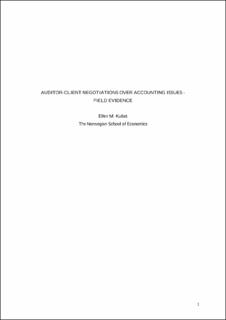| dc.description.abstract | This study investigates the relationship of each of four variables to the auditor’s combined use
of the contending and the conceding strategy in auditor-client negotiations over accounting
issues. These variables are the precision of accounting regulation, the audit partner’s general
level of experience, the client’s accounting expertise, and the auditor-client relationship.
Based on a survey of 79 auditor-client negotiations conducted in one of the big-four audit
firms, I find that as hypothesized the precision of accounting regulation is positively related to
the auditor’s choice of negotiation strategy (i.e. the more precisely regulated the accounting
issue is, the more contending is the auditor’s overall negotiation strategy) and that the client’s
accounting expertise and the quality of the auditor-client relationship are negatively related to
the auditor’s combined use of the contending and the conceding negotiation strategy (i.e. the
higher the client’s accounting expertise, the less contending is the auditor’s overall
negotiation strategy and the more positive the auditor-client relationship, the less contending
is the auditor’s overall negotiation strategy). The partner’s experience is found to be
positively related to the auditor’s combined use of the contending and the conceding
negotiation strategy (i.e. the more experience the partner has, the more contending is the
auditor’s overall negotiation strategy). Further findings indicate that the precision of
accounting regulation is by far the most important independent variable. The study also
investigates the importance of the variables—the precision of accounting regulation, the audit
partner’s general level of experience, the client’s accounting expertise, the auditor-client
relationship and the auditor’s combined use of the contending and the conceding negotiation
strategy—in predicting accounting outcomes of auditor-client negotiations over accounting
issues. I find that the most important variable in predicting the accounting outcome is the
precision of accounting regulation, but the auditor’s choice of negotiation strategy and the
audit partner’s general level of experience also seem to have effects, as does audit risk as a
control variable. | en_US |
